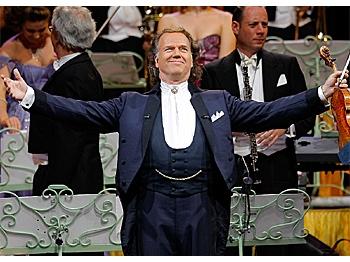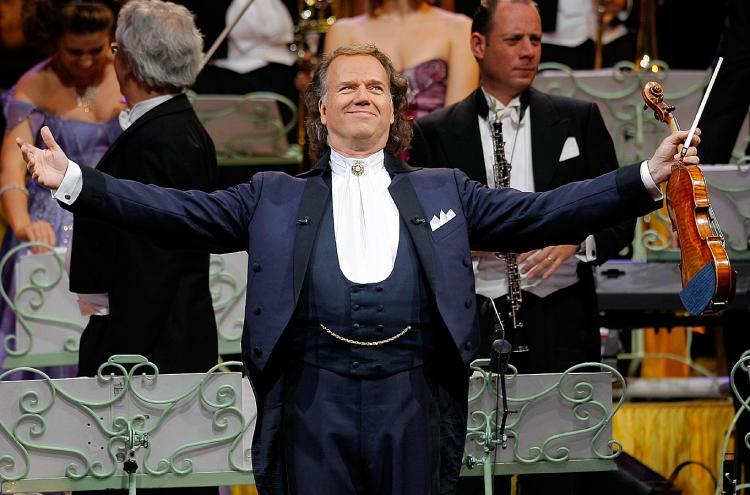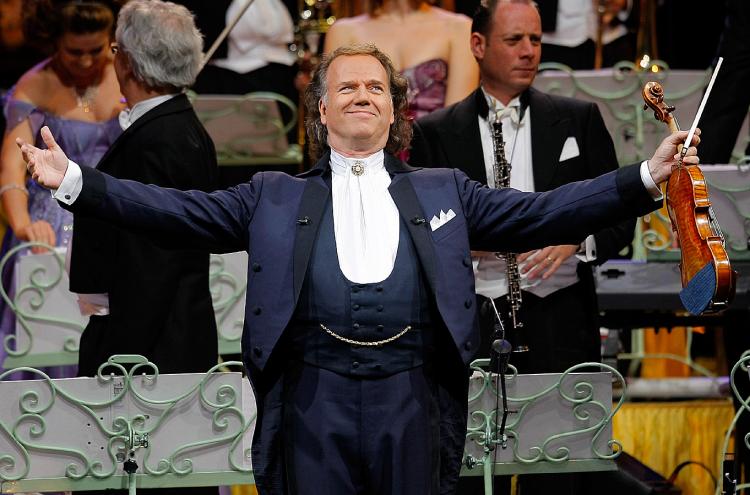The mostly over-50 audience showed their enthusiasm right from the start as Rieu and his orchestra made their entrance from the back of the stadium, marching through the crowd toward the stage.
On this his 30th Anniversary Tour 2009, Rieu’s set list was made up of audience favourites from different genres that span centuries. Beginning with “March of the Toreadors” from the opera Carmen, Rieu and his orchestra covered everything from Johann Strauss to James Horner’s “My Heart Will Go On” from the movie Titanic.
Rieu and his orchestra seamlessly moved from the sublime to the ridiculous to the serious to the humourous, all the while remaining true to the music and its delivery. The revelry of “The Merry Widow” sung by his three fantastic tenors was tempered with Beethoven’s “Ode to Joy” and “The Theme from Exodus.”
A particular highlight was the beautifully rendered “Time to Say Goodbye,” an Italian crossover song that Rieu referred to as “the song of our age.”
He played two numbers from his mentor Johann Strauss: “Silver and Gold” and “The Blue Danube.” The latter had audience members waltzing in the aisles as is the tradition at an Andre Rieu concert.
There were plenty of moments of mischief and laughter and Rieu was not shy about cracking a few jokes and add some visual stunts to the evening’s entertainment. Due to well rehearsed spontaneity, the audience was made to feel like they were a part of the event. In one of the many lighter moments, a costumed bull prancing through the aisles, spotted a lady in a bright red dress and chased her out of the building.
A moving violin solo by Rieu of “O Canada” brought the crowd to their feet to close the performance.
Having travelled the world playing music for over 30 years, Rieu has mastered his craft and his audience, and it was clear form the outset that he was fully in charge of the evening. The audience was more than happy to let him weave his spell and go along for the ride.
In the true spirit of Johann Strauss, period costumes brought a distinctive old-world flavour to the performance. The colourful pastel dresses and tuxedos harkened back to a time of regal ballrooms, ladies in swirling gowns, and gentlemen bowing to their partners.
What made the concert work so well was Rieu’s obvious passion and love for the music he makes. His orchestra is top notch and all its members seem to share his enthusiasm for their craft, expressing a genuine enjoyment that would be impossible to fake. They played with such expertise that it was impossible to not be impressed with the calibre of the musicianship.
A regular fixture on PBS, Rieu has steadily grown into a bona fide star in the entertainment world. A true ambassador of the music of Johann Strauss, he has become something of a rock star in the classical music world.
By blending old and new and bending all the rules, Rieu causes traditionalists to squirm in their seats while inspiring many more to stand up and cheer. He has carved a niche in the genre, and judging from his immense popularity it is clear that he is filling a void.
While critics are quick to point out Rieu’s over the top showmanship and disregard for the rigid protocols that accompany much of the music of the genre, it cannot be denied that his music brings immense joy to his audience—an audience that wants to hear the music of the ages and still feel comfortable enough to laugh, sing, and dance.








